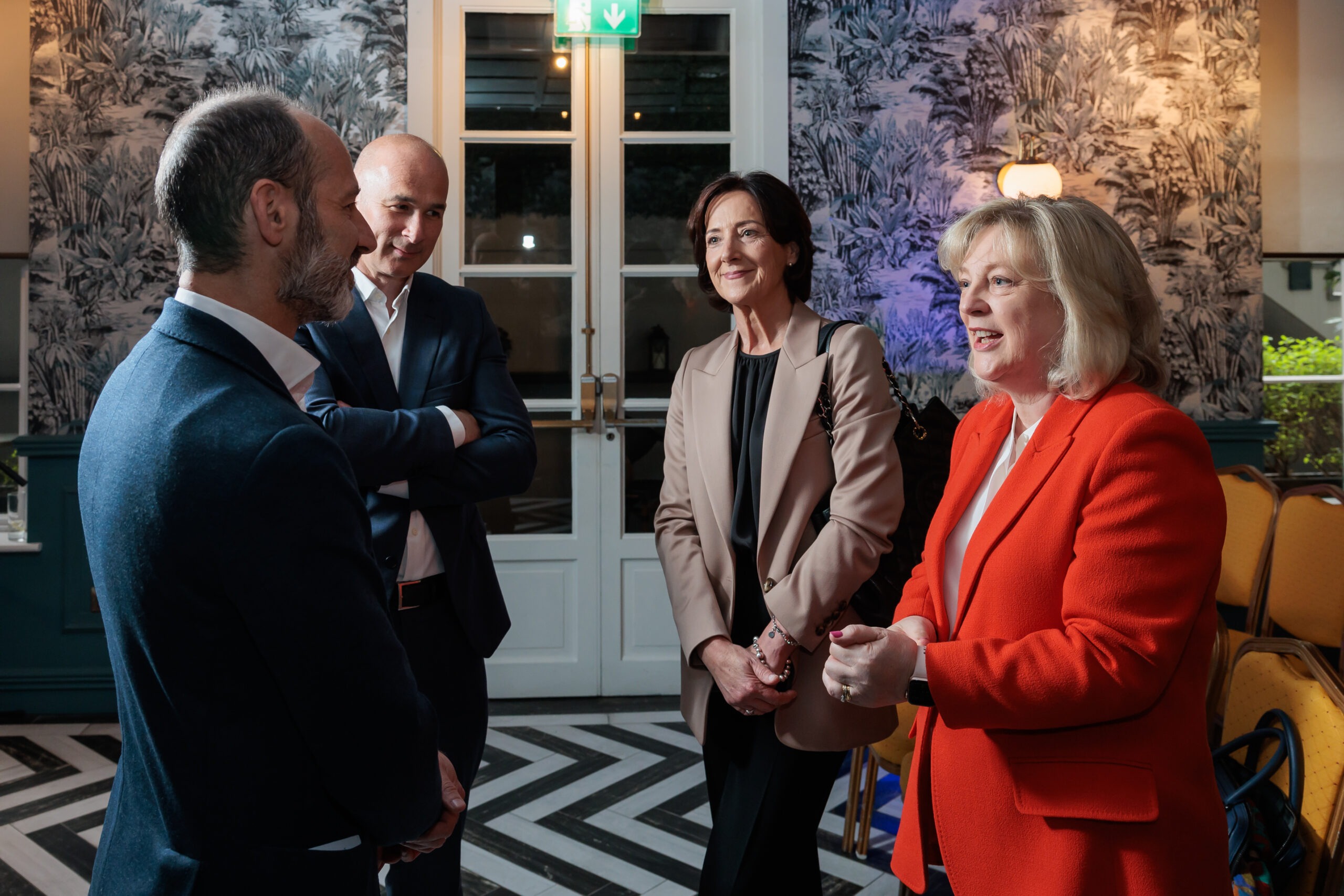Susan Spence built one of the country’s largest indigenous technology companies before selling it earlier this year. Vicki O’Toole ran JJ O’Toole, a Limerick packaging business established in 1914. Like Spence, she navigated a sale of the business in late 2022. Marco Donzelli is the CEO of HLB International, a global network of independent advisory and accounting firms with more than 1,000 offices.
Combined, they have real-life experience leading, growing and selling businesses in the context of a rapidly changing future.
And in recent weeks, they each brought their unique perspective to a HLB event entitled, “The Future in Focus: Leadership Insights for 2024”. Introduced by Mark Butler, the managing partner of HLB Ireland, more than 100 business leaders attended the event held at the Iveagh Hotel in Dublin 2.
Here are some of the key takeaways from the evening.
“In business, timing is absolutely everything”
Susan Spence co-founded SoftCo 34 years ago with her brother Jim Coffey, before selling the business to Keensight Capital, a European growth buyout firm, in March. “In the tech world, 34 years is a very long time to have the original shareholders still present in the business,” Spence said. “But in those years, it’s been like having five different businesses.”
To stay ahead, SoftCo had to be prepared to change to win new customers, retain its loyal base, and not be disrupted by new technologies. She said SoftCo today was used by two million people globally with its software automating e-procurement, accounts payable, vendor management, payments and compliance.
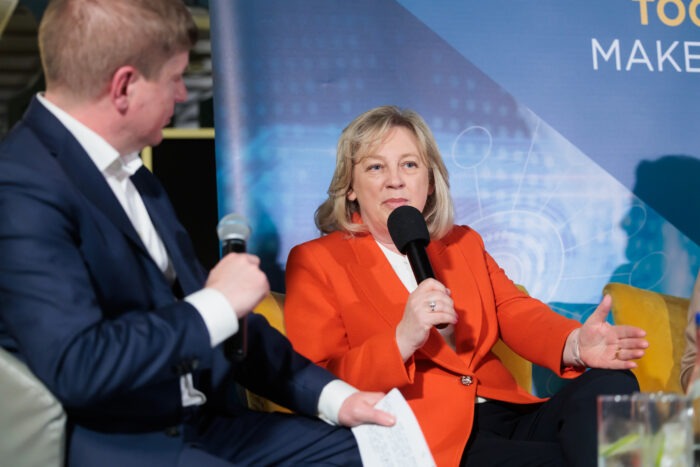
Its clients include Primark and Patagonia, as well as state bodies and SMEs. She said she decided to sell the company when it was on a strong trajectory. “When we decided to sell the business, we had 25 per cent year-on-year growth,” she said. “And, more importantly, we were profitable.”
Spence said she and her brother wanted to retire. “The business was in a perfect position in terms of its growth,” Spence said. “We were dominating the competition. In business, timing is absolutely everything. I think if we were ten years younger, we probably wouldn’t have done it. But we analysed the business and we set our sales targets, our Ebitda number and our ARR [annual recurring revenue] which is particularly important. They were all growing.”
SoftCo had hit its numbers for ten quarters in a row, so when the decision was made to sell the business it received interest. Spence said Keensight Capital, a European growth buyout firm, won out for various reasons including that it had invested already in complementary businesses.
“It understood our business,” she said. The management team of Softco, who was staying on, also liked Keensight. “Management are all participating and taking the business to the next phase,” she said.
Making the hard decision to sell
Vicki O’Toole got involved in Ireland’s oldest packing company JJ O’Toole after marrying Fergus O’Toole. It was a third-generation, 109-year-old firm, but O’Toole only got deeply involved in the company as a young mother after her husband fell ill. At the time, the company’s turnover had been slashed overnight following the introduction of the plastic bag tax.
“I had no experience of packaging,” she recalled. “As time went on, Fergus spent more time at home, and I spent more time in the office.”
O’Toole’s husband died in 2010, and she initially thought about selling the business at that time “I couldn’t see how I could look after five children and manage the business without Fergus,” she said.
Her brother convinced her to give it a month, and with the support of her colleagues, she decided to keep going. The years went by, and her son JJ grew up and went into aviation financing. She asked him to assist her in the business, but she said it didn’t work out. They went to a packaging conference in Frankfurt and over a few glasses of wine, JJ admitted he missed his old industry.
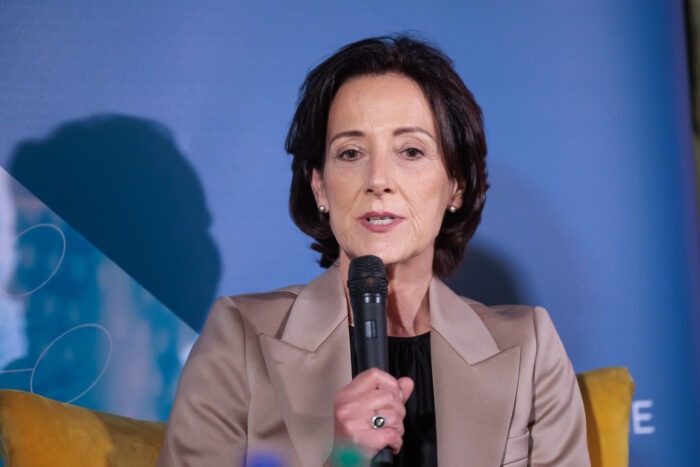
“The relief was incredible,” O’Toole recalled. “So he left, and we were both happy, as doing something you hate is not worth doing, and you certainly won’t succeed in it.”
Eighteen months ago, Vicki O’Toole sold her business. The decision to do so happened in October 2021, when O’Toole recalled being in the rain in her garden on a bank holiday trying to fix a hole that her dog was using to escape out of. “I remember looking up to heaven and thinking ‘Fergus, this is your job,’” O’Toole told the event. She went inside, had an omelette and a glass of wine – and a moment of clarity. “I felt if you’re not here to fix the fence, does it really bother you if I sell the company?” she said.
“I knew my children didn’t mind if I sold the company, but that I was doing it for them to continue the legacy of the O’Toole family.” On the Tuesday after the bank holiday, she started the process of selling JJ O’Toole, which was bought by Zeus Packaging.
The perfect place
Marco Donzelli started with Deloitte in Naples, before spending seven years with Deutsche Bank. For the past 12 years, he has worked with HLB International. Donzelli was initially responsible for developing HLB’s network before becoming its chief operating officer in 2015, and global CEO in 2017. “I have been mentoring entrepreneurs and professionals for around ten years,” he said. HLB’s network today has 47,000 people in 157 countries with a combined turnover of $5.5 billion.
Under Donzelli, it has expanded into advisory work in recent years. Donzelli said Ireland was an important market to its network. “Mark (Butler) and his team are leading one of the best practices in our network. Ireland has seen tremendous growth, which is down to great leadership, and also the country is doing well,” he said. “Dublin has changed a lot in the last 15 years. It has very educated people, many great companies are based here, and after Brexit, it has an advantage too. It’s the perfect place.”
Surviving crisis and becoming confident
Susan Spence recalled that, during the pandemic, one of SoftCo’s big customers, a major retailer, saw all its stores globally close. “They said we have to have your software because we need to see our invoices and what we’re liable to pay,” she said. “From a business point of view, the disruption then drove automation.”
SoftCo, she said, had incorporated AI and machine learning to help its customers process invoices, so it had an advantage. “It delivers massive cost savings,” Spence said. She said instead of having large teams processing invoices, now that could be done by machines allowing more people to be deployed dealing with exceptions faster.
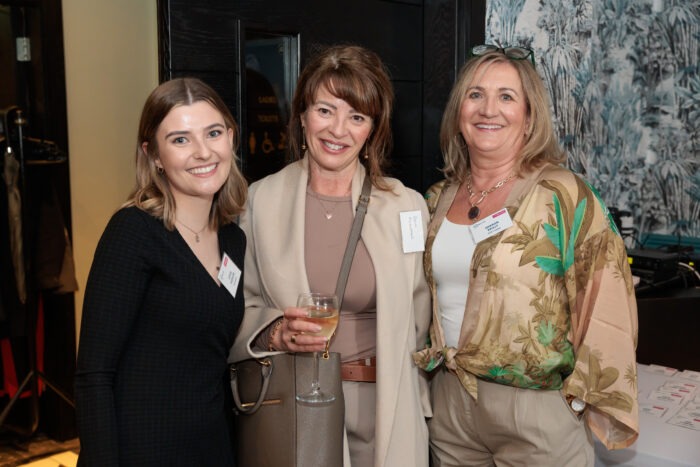
O’Toole said JJ O’Toole also survived multiple crises, but she said this was part of business. After selling her company, she spends time trying to share her experiences with other entrepreneurs. “Most of them are female,” she said. “They’re really successful people. But one of the biggest common denominators is that they have no confidence. They believe that they will never be able to do what others did. But I always tell them the honest truth, which is I didn’t know exactly what I was doing a lot of the time, and I suffered hugely from imposter syndrome.
“When I speak to entrepreneurs, I tell them I was afraid of that too, but I got through it. Entrepreneurs are normal people with the exact same problems as everybody else. I think the only difference is just that we never, ever give up.”
Optimism, showing vulnerability
Marco Donzelli said HLB International published its global CEO survey in April, which found “more optimism” than in previous years. He said it was notable how many CEOs believed that AI and innovation would help them grow more. “CEOs are really trying to take the opportunities offered by AI,” he said.
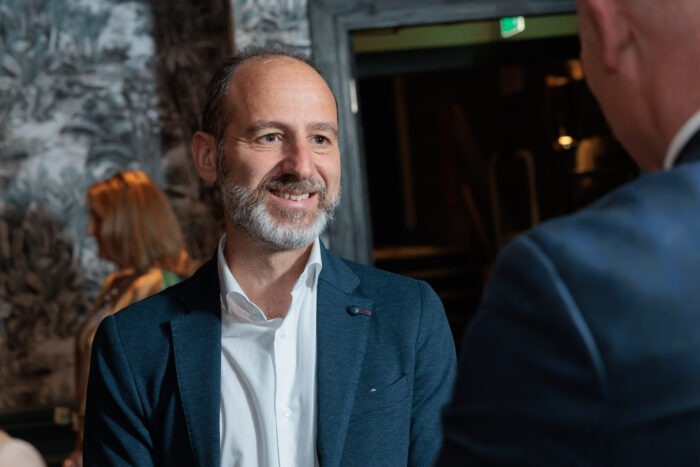
Businesses, he said, needed to think where AI could work for them. “AI is just a tool like the internet was when it started,” he said. “It is not the business itself, but it is an instrument to do something else. The risk is that you try to achieve too many things and disperse all your resources. The key thing is to understand the key use cases for AI in your business.” Donzelli said AI offered benefits in bringing efficiencies and streamlining processes as well as using it for predictive analytics to help decision-making.
Spence said she got her first break in business at Hewlett-Packard when a colleague encouraged her to go into sales. “When you are in sales, you get to understand other people’s businesses so you see opportunities,” she said. This gave her the idea to co-found SoftCo with her brother. “The advice I would give people is it’s all about the sales, it is all about the customers,” Spence said, adding that when the pandemic ended the first thing she did was a tour of the United States to meet her customers. “People appreciate it when you go and meet them,” she said.
SoftCo, according to Spence, set up a customer success team to talk to customers, whether they are happy or unhappy. “If you have customers who are referenceable customers, you win new business,” she said. She said this counted too when SoftCo was being sold, as in due diligence its customers gave positive feedback.
“The two most important things are customers and sales, keep the focus on that,” she advised.
O’Toole said she was an accidental chief executive. “You have to be able to show vulnerability,” she said. “Too many leaders feel that they have to have all the answers. You are also saying I’m right, and you’re wrong, and that’s the way it is. You need to be vulnerable.”
She said she did not finish university but had learned some management skills by bringing up five children. “The other thing we need to do as leaders is leave our egos at the door,” she said. “First is the customer. They have to be number one because if we don’t have them, we have no jobs.”
She said leaders also had to set an example to their team. “If we had a big client coming, I would be the one in the car park pulling up the weeds, or cleaning the skirting boards. You have to work the hardest, and I never asked anybody to do something that I wouldn’t do myself.”
“We were a family business so you’re ingrained in the walls.”
Vicki O’Toole
Vicki O’Toole said selling a business was hard, and required resourcing. “When you’re selling a business, you are also still managing the company and running it. There is no guarantee that it is going to sell,” O’Toole said. “It is super, super stressful. And then when you sign the dotted line, I actually burst into tears. It was like handing over a child for adoption. I was so upset, as you’re unsure if you made the right decision. We were a family business so you’re ingrained in the walls.
“My colleagues and our clients, we’d worked with some of them for 30, 40 even 50 years. Nobody can really explain to you what it is like to sell until you do it.”
She said nobody can explain either what Act Three is like after selling the business: “You’re hoping the business is being looked after fine.” O’Toole said she can garden, spend time with her life, and manage her own diary. “I was there every day, and if I wasn’t there I was thinking about it. I was dreaming about it at night!” O’Toole said. “Birds don’t fly backwards. You need to be really, really sure this is what you want to do.”

Spence agreed with O’Toole about how time-consuming selling a business is. “Anybody who says it will all be done in six weeks is a liar,” Spence said. “It takes longer than you think.”
She said it was important to resource the business well, as due diligence was time-demanding. “It’s a massive burden on everybody. You will need more people. If your finance systems are not great, make sure you have the right reporting tools in place as you will be asked to slice and splice data a million different ways.”
Being agile, and gut instinct
For Marco Donzelli, leading a vast network of professionals means being flexible and open. “You need to have an agile mindset,” Donzelli said. “One thing I have also learned is to be genuine and true to yourself. People will lose trust in you otherwise. You also need to trust your people, you cannot make things happen otherwise.”
Donzelli also said: “Leaders have to have the courage to make bold decisions. If you don’t make them, things will happen one way or another, and you will not be in the driving seat without a plan.” He said it was sometimes better to risk making a mistake, rather than making no decision. Donzelli said HLB was a services business, so it was especially important to put people at the centre. “You really need to be as inclusive as possible,” he said. “That’s the key to everything. You also need to be extremely organised and have a general framework in mind of what you’re trying to achieve. But it is about the team, and treating people like people.”
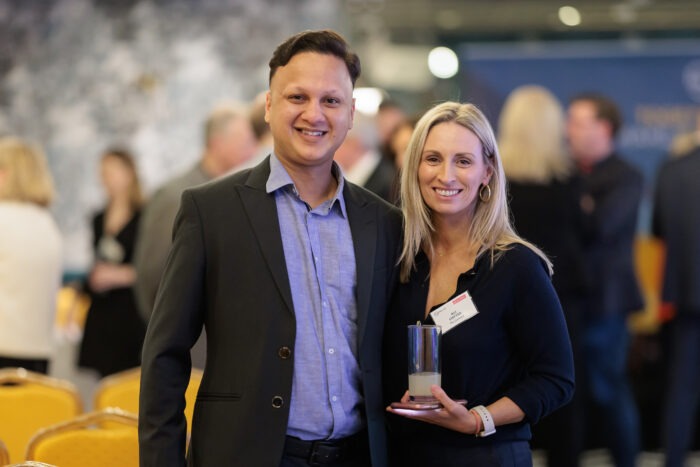
Susan Spence said she did use data when decision-making, but not always. She was a hockey goalkeeper so she agreed instinctively when asked to sponsor Ireland women’s hockey team after it qualified for the Hockey World Cup in London in 2018.
The event was in England, and the team was due to play the United States so there was a marketing strategic fit, but she didn’t think like that. “We did it because we wanted to do it,” she laughed. Her faith in the team paid off, as it unexpectedly reached the World Cup Final, making Irish and global headlines.
Spence said she learned a lot sponsoring the team from watching its then captain Katie Mullen in action. “She always went out on the pitch with a big smile,” Spence recalled. “Coming into the office it is important to do the same. The team also did this no prima donna stuff. They played the game together. There were no cliques.
“They had the right attitude, a work ethic and camaraderie to create the perfect environment to succeed. It’s something we can all learn in business to create that kind of environment for our own businesses.”
